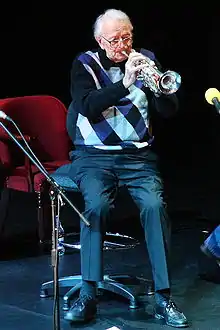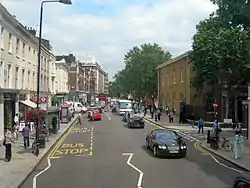Hooray Henry
In British English slang, Hooray Henry or Hoorah Henry (plural: Hoorah/Hooray Henrys/Henries) is a pejorative term, comparable to "toff", for an upper class British male who exudes loud-mouthed arrogance and an air of superiority, often flaunting his public school upbringing. It is cited as the male equivalent of a "Sloane Ranger", although the female equivalent of a Hooray Henry is sometimes referred to as a Hooray Henrietta.[1][2]
Coined as "Hoorah Henry" in 1936 by American author Damon Runyon in his short story "Tight Shoes", it became a common term in the UK in the 1950s when it was originally used to refer to the boisterous upper class fans of jazz trumpeter Humphrey Lyttelton who would shout "Hoorah!" between the pieces he performed at the 100 Club in London. More recently, the term has become commonly used in the British tabloid newspapers to express contempt towards the lifestyles of the upper class and their privileged upbringings in expensive public schools such as Eton College, and esteemed universities such as Oxford and Cambridge. In both the United Kingdom and the United States, the term has frequently been used in a political context to refer to certain members of the British Conservative Party, including former Prime Minister David Cameron who had such an upbringing, and has also been used negatively towards those associated with events such as the University Boat Race and Royal Ascot. Despite its generally negative connotation, several restaurants, clubs and boutiques have adopted the name in a more favourable light to imply class and style.
Definitions
Eric Partridge describes a Hooray Henry as a "male of the upper classes who exhibits a superior or anti-social manner".[3] The Cambridge Dictionary defines one as a "young man from a high social class who speaks loudly and behaves in a noticeable way in public."[4] In the Cassell Dictionary of Slang (1998), Jeff Grant defines a Hooray Henry as a "rich young man given to much public exhibitionism, drunkenness and similar antisocial activities, all based on an excess of snobbish self-esteem."[5] Chambers Dictionary simply defines the term as "a young middle - or upper class man with a loud voice and ineffectual manner".[6]
The term has a similar meaning to "toff" and "rugger bugger" and is seen as the male equivalent of "Sloane Ranger".[1] It is usually applied to a snobbish, arrogant aristocratic male with a privileged public school and university (Oxford or Cambridge) background, or simply a well-spoken, well-educated, wealthy, pompous male who stands out among lower classes.
Origins

The term was originally coined as "Hoorah Henry" in 1936 by American author Damon Runyon in his short story "Tight Shoes".[1][3] Runyon used it when describing his character Calvin Colby, a rich layabout, saying, "He is without strict doubt a Hoorah Henry, and he is generally figured as nothing but a lob as far as doing anything useful in this world is concerned".[7][8] Albert Jack challenges the idea that Runyon made the term popular, crediting Jim Godbolt with the correct explanation of its popularity. Godbolt remembers that in 1951 it was used to refer to the fans of Old Etonian jazz trumpeter Humphrey Lyttelton who would turn up in droves to the 100 Club in Oxford Street, London and shout in loud, upper class voices between songs, "Hooray!, Hooray!". Lyttelton himself has commented on the term but credits Runyon with coining it; he once stated in an interview, "In jazz circles, aggressively "upper class" characters are known as Hoorays, an adaption, I believe, of Damon Runyon's "Hooray Henries".[9]
For the English language specialist David Crystal, the term is usually given to the "loud-mouthed ineffectual upper class twit". He explains that it began appearing in British literature in the 1950s, although the Americans then "seemed to lose track of the term". As a result, it was often included in British English guides in order to assist Americans.[7] By the 1960s, the term was likened to Sloane Rangers,[10] a term later applied to women such as Lady Diana Spencer before she married Prince Charles.[11]
Usage
The term is frequently used in tabloid newspapers and people continue to use "Hooray Henry" to refer to somebody of the upper class even outside the UK, although it is most commonly used in British English slang. British tabloids and American newspapers such as The Huffington Post of New York City often use the term "Toff" or "Hooray Henry" to describe the elite of the British Conservative Party;[12] a 2012 article for instance referred to British Prime Minister David Cameron and the Tories as "Cameron and the Hooray Henry brigade".[13]
Other institutions also have a reputation for having a "Hooray Henry" image. The participants and viewers of the University Boat Race are frequently referred to as Hooray Henries or toffs, even by non-tabloid media like The Guardian who said that it is "easy to sneer at the kind of event where triumphant, red trouser-wearing hooray-henrys greet their returning heroes with a rousing rendition of the timeless rowing shanty I'd Rather Be a Leper Than a Cam",[14] and CNN who spoke of the "Barbour jacket-wearing 'hooray-henry' crowd", posing the question as to whether the boat race was a "prestigious battle, a vulgar display of elitism, or the ultimate meritocracy."[15] A 2005 Wales Online article reported on how the Countryside Alliance were acutely aware of their "Hooray Henry" image and that they were very keen to change their image and how they were perceived in Wales.[16]
The upper-class people who turn up at horseracing events, particularly Royal Ascot, have also often been cited as Hoorah Henries.[17][18] The journalist Robert Chesshyre spoke of the "Hooray Henry world of polo, gatecrasher balls and indolent ostentation at Ascot and Henley" in his 1987 book The Return of a Native Reporter.[19]
In 2011, the London Evening Standard mocked the debauchery by the Hooray Henries of Kings Road, Chelsea during the economic recession. Richard Godwin remarked:

"At a time when the economy teeters towards a double dip and their immediate peers are taking to the streets to rage against rising costs of education, a hopeless jobs market and dim prospects of affording a home, one set is partying like there's no tomorrow. They're not the ones who may actually have no tomorrow, though there is a distant worry that their privileged place in London society is under threat. Mostly, the Public kids - or the Jack Wills Generation, taking that 'outfitters to the gentry' at its word - are above these concerns... They are in their late teens and early twenties, fresh out of Eton, Charterhouse, Harrow and Stowe and revelling in the freedom from institution. Many of them are unemployed, or 'funemployed', as they like to call it."[20]
The cast of the series Made in Chelsea with their privileged upbringings and glamorous lifestyles, who inhabit some of London's wealthiest areas including King's Road, Belgravia and Knightsbridge, have also been referred to as Hooray Henries;[21] Glamour Magazine cites one of its stars as having a "wardrobe comprised entirely custom-made suits" and "many luxury pads across the globe".[22]
Positive usage in retail
Though the term's usage is generally limited to the UK,[23] David Crystal notes that the term is in use in India, but is sometimes used in a less derogatory context to describe a man of class and style; he states that a clothing line in Kolkata used the banner "Hoorah Henry" to promote a fashionable men's clothing line.[7] Restaurants, clubs, and boutiques have also embraced the term more favourably to indicate class, including Hooray Henry's Restaurant and Hooray Henry's Boutique in Great Yarmouth in England and Hooray Henry's restaurant in West Hollywood, California in the US.[24] A Coventry-based firm, Hooray Henry's, also plays upon the name and rents out chauffeur-driven Rolls-Royces and Jaguars for weddings.[25]
References
- Cresswell, Julia (9 September 2010). Oxford Dictionary of Word Origins. Oxford University Press. p. 404. ISBN 978-0-19-954793-7.
- Silverstone, Rob (1 March 2007). Mule in Brighton - a Taste of the Downs. Pegasus Elliot Mackenzie Pu. p. 33. ISBN 978-1-84386-310-6.
- Partridge, Eric (2008). The Concise New Partridge Dictionary of Slang and Unconventional English. Routledge. p. 341. ISBN 978-0-415-21259-5.
- "Hooray Henry". Dictionary.cambridge.org. Retrieved 25 September 2013.
- "Hooray Henry.(puns)(Brief article)". Word Ways, accessed via HighBeam Research. 1 May 2009. Archived from the original on 11 June 2014. Retrieved 25 September 2013.
- Chabers 21st Century Dictionary. Allied Publishers. pp. 647–. ISBN 978-81-8424-329-1. Retrieved 25 September 2013.
- Crystal, David (2008). By Hook Or by Crook: A Journey in Search of English. Harper Perennial. p. 177. ISBN 978-0-00-723557-5.
- "Hen-pecked Quotes". Your Dictionary. Retrieved 26 September 2013.
- Jack, Albert (5 October 2006). Shaggy Dogs and Black Sheep: The Origins of Even More Phrases We Use Every Day. Penguin Adult. p. 80. ISBN 978-0-14-103956-5.
- Thorne 2009, p. 528.
- Parrill & Robison 2013, p. 112.
- Lewis, Martin (11 May 2010). "UK Election Winner! Meet the New Toff (Same as the Old Toffs)". Huffington Post. Retrieved 25 September 2012.
- Ellis, Shan (4 July 2012). "David Cameron: 'Children Should be Seen and Not Heard". Huffington Post. Retrieved 25 September 2012.
- Glendenning, Barry (31 March 2013). "Oxford University beat Cambridge to win Boat Race by length and a half". The Guardian. Retrieved 25 September 2013.
- McKenzie, Sheena (1 April 2013). "Champagne and wild boar sausages: A very British boat race". CNN. Retrieved 25 September 2013.
- "Countryside chief to send Hooray Henry image packing". Wales Online. 1 November 2005. Retrieved 25 September 2013.
- Berryman, James (2000). A Sting in the Tale. Mirage Publishing. p. 178. ISBN 978-1-902578-13-2.
- McGovern, Derek (17 June 2008). "Royal Ascot: Even I'll be saying hooray, Henry!". Daily Mirror. Retrieved 25 September 2013.
- Chesshyre, Robert (1987). The Return of a Native Reporter. Viking. p. 138.
- "The Hooray Henrys bringing chaos to the King's Road". London Evening Standard. 27 April 2011. Retrieved 25 September 2013.
- "Working class or middle class? It's not so clear-cut any more". Portsmouth City Government. 7 September 2013. Retrieved 25 September 2013.
- "TOWIE V Made In Chelsea". Glamour Magazine. Retrieved 25 September 2013.
- Partridge 2006, p. 1027.
- Gelt, Jessica (17 June 2013). "Hooray Henry's, a new club from the Bootsy Bellows' crew, to open next month". Los Angeles Times. Retrieved 26 September 2013.
- "Wedding Cars". Hoorayhenrys.co.uk. Retrieved 25 September 2013.
- Bibliography
- Parrill, Sue; Robison, William Baxter (1 January 2013). The Tudors on Film and Television. McFarland. ISBN 978-1-4766-0031-4.CS1 maint: ref=harv (link)
- Partridge, Eric (2006). The New Partridge Dictionary of Slang and Unconventional English: A-I. Routledge. ISBN 978-0-415-25937-8. Retrieved 25 September 2013.CS1 maint: ref=harv (link)
- Thorne, Tony (1 January 2009). Dictionary of Contemporary Slang. A&C Black. ISBN 978-1-4081-0220-6.CS1 maint: ref=harv (link)
External links
| Look up Hooray Henry in Wiktionary, the free dictionary. |
- The Hooray Henrys bringing chaos to the King's Road, London Evening Standard
